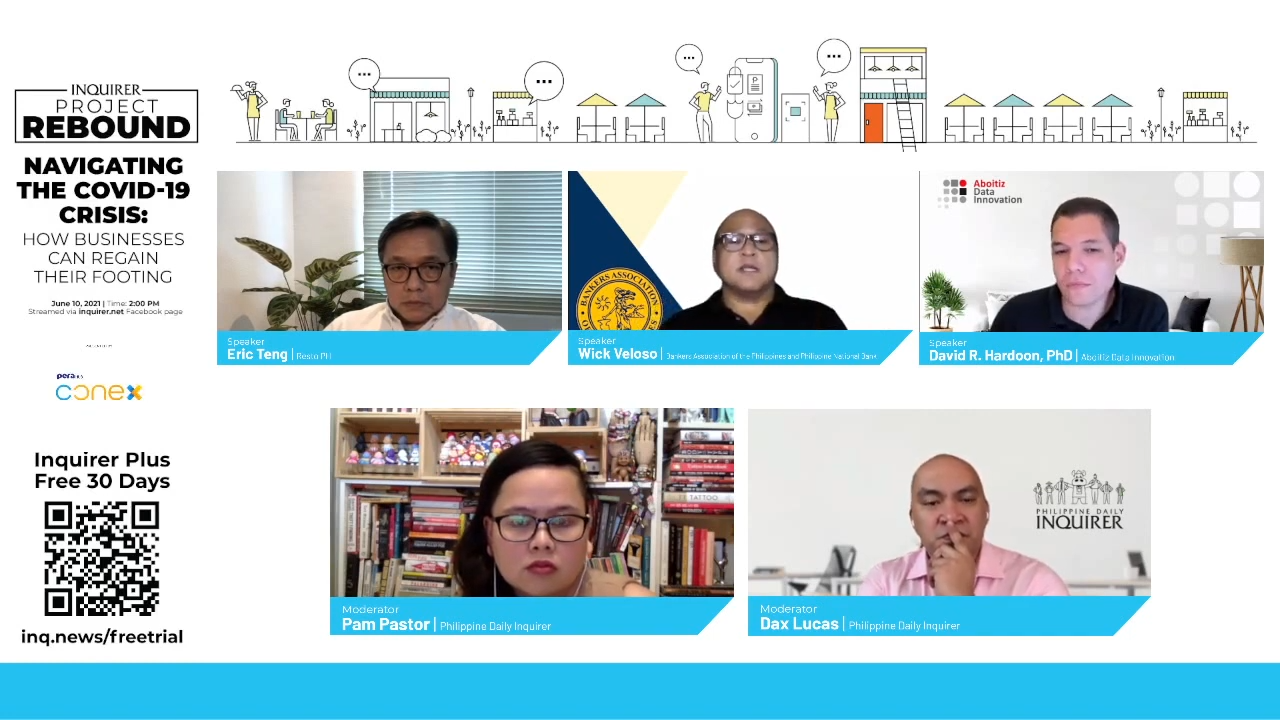After a year of doom and gloom brought about by the COVID-19 pandemic, local business leaders are seeing the light at the end of the tunnel. Eric Teng, president of the Restaurant Owners of the Philippines (Resto PH), an organization of restaurant owners; Wick Veloso, new president of the Bankers Association of the Philippines; and David Hardoon of Aboitiz Data Innovation, the data science and artificial intelligence arm of the Aboitiz Group, all struck a hopeful note and painted a positive picture for the months ahead at the recent session of Inquirer Project Rebound. The latest edition of the Inquirer’s regular Facebook webinars moderated by Inquirer Business’ Senior Reporter Daxim Lucas and Inquirer Assistant Lifestyle Editor Pam Pastor focused on the theme “Navigating the COVID-19 Crisis: How Businesses Can Regain Their Footing.” Teng, chief executive officer and president of Mango Tree Restaurants Philippines, said he expected a lot of improvements in the third quarter of the year. As more people got vaccinated, “people might not even have to wear masks anymore, like in the United States.”

If the vaccine could fix the problem, Veloso, the new president of the Philippine National Bank (PNB), urged for its quick roll-out to reach as many Filipinos as possible so people could socialize again and human interaction could resume.
Veloso pointed out, “If people remain afraid to resume their [usual] activities, the problem will continue.”
Hardoon said the experience of other countries showed there was a solution to the problem. It underscored the need “to vaccinate aggressively” people against COVID-19.
Teng noted, “There are so many indications that the worst may be behind us.”
But while people are talking about a new normal when the pandemic is vanquished, Teng said it would be more like the old normal for the food and beverage sector. “For the restaurant industry, things would not really change in some ways. People still have to eat, they have to celebrate and hold family get-togethers.”
Hardoon said the challenges created by the pandemic were “a testimony to human resilience.” He said, instead of thinking about going back to the way things were, people should strive to “emerge stronger.” The pandemic, he said, was “an opportunity to rethink processes and find new ways of doing things.”
Pointing out that a similar crisis could arise in the future, Hardoon stressed the need for innovation and technology to cope with new challenges. “The world has changed so we have to look at how to incorporate (innovation and technology).”
He said what was needed was “augmentation, not replacement.”
Veloso also said the pandemic showcased the Filipinos’ resilience. He expected this resilience to grow over the next months.
“Last year was fundamentally the worst because we had no idea what we were dealing with,” he said. It was so eerie, he said, to see empty roads and buildings. “People stopped doing what they were doing. Human interaction stopped.”
Veloso expressed the banks’ willingness to help businesses that were in dire straits. Financial regulators should allow banks to do what they could for their clients and should not be penalized for it. Other countries, he said, eased their financial rules during the pandemic so banks could help those in need.
To hasten the country’s return to the old normal or to create a new one—however one would want to see it—the three business leaders stressed the need to take to heart lessons learned during the crisis, to adopt new strategies and practices and to adapt to the changes brought about by the pandemic.
Teng encouraged people “to get vaccinated as soon as possible to open up the economy. Follow the science and overcome misinformation.”
Veloso, who said effective and efficient communication with PNB’s staff and branches served them in good stead all these months, stressed the need to communicate with employees, regulators, customers and the public to accomplish set goals and objectives.
Hardoon reiterated his call for companies to “emerge stronger,” harnessing innovation and technology not only to put an end to the current crisis but also to prepare for future challenges.







